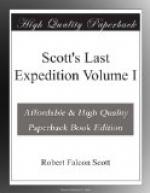Signs of open water round and about are certainly increasing rather than diminishing.
Friday, December 16.—The wind sprang up from the N.E. this morning, bringing snow, thin light hail, and finally rain; it grew very thick and has remained so all day.
Early the floe on which we had done so much ski-ing broke up, and we gathered in our ice anchors, then put on head sail, to which she gradually paid off. With a fair wind we set sail on the foremast, and slowly but surely she pushed the heavy floes aside. At lunch time we entered a long lead of open water, and for nearly half an hour we sailed along comfortably in it. Entering the pack again, we found the floes much lighter and again pushed on slowly. In all we may have made as much as three miles.
I have observed for some time some floes of immense area forming a chain of lakes in this pack, and have been most anxious to discover their thickness. They are most certainly the result of the freezing of comparatively recent pools in the winter pack, and it follows that they must be getting weaker day by day. If one could be certain firstly, that these big areas extend to the south, and, secondly, that the ship could go through them, it would be worth getting up steam. We have arrived at the edge of one of these floes, and the ship will not go through under sail, but I’m sure she would do so under steam. Is this a typical floe? And are there more ahead?
One of the ponies got down this afternoon—Oates thinks it was probably asleep and fell, but the incident is alarming; the animals are not too strong. On this account this delay is harassing—otherwise we should not have much to regret.
Saturday, December 17.—67 deg. 24’. 177 deg. 34’. Drift for 48 hours S. 82 E. 9.7’. It rained hard and the glass fell rapidly last night with every sign of a coming gale. This morning the wind increased to force 6 from the west with snow. At noon the barograph curve turned up and the wind moderated, the sky gradually clearing.
To-night it is fairly bright and clear; there is a light south-westerly wind. It seems rather as though the great gales of the Westerlies must begin in these latitudes with such mild disturbances as we have just experienced. I think it is the first time I have known rain beyond the Antarctic circle—it is interesting to speculate on its effect in melting the floes.
We have scarcely moved all day, but bergs which have become quite old friends through the week are on the move, and one has approached and almost circled us. Evidently these bergs are moving about in an irregular fashion, only they must have all travelled a little east in the forty-eight hours as we have done. Another interesting observation to-night is that of the slow passage of a stream of old heavy floes past the ship and the lighter ice in which she is held.
There are signs of water sky to the south, and I’m impatient to be off, but still one feels that waiting may be good policy, and I should certainly contemplate waiting some time longer if it weren’t for the ponies.




